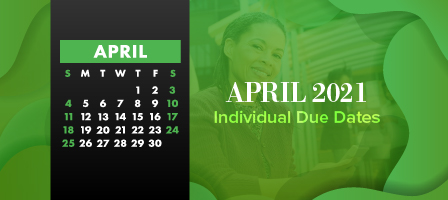April 2021 Individual Due Dates
 April 12 - Report Tips to Employer
April 12 - Report Tips to Employer If you are an employee who works for tips and received more than $20 in tips during March, you are required to report them to your employer on IRS Form 4070 no later than April 12.
April 15 - Taxpayers with Foreign Financial Interests
A U.S. citizen or resident, or a person doing business in the United States, who has a financial interest in or signature or other authority over any foreign financial accounts (bank, securities, or other types of financial accounts), in a foreign country, is required to file Form FinCEN 114. The form must be filed electronically; paper forms are not allowed. The form must be filed with the Treasury Department (not the IRS) no later than April 15, 2021, for 2020. An extension of time to file of up to 6 months is automatically allowed. This filing requirement applies only if the aggregate value of these financial accounts exceeds $10,000 at any time during2020. Contact our office for additional information and assistance filing the form.
The IRS has extended the normal April 15 individual tax return due date to May 17. Caution: the extension does not apply to the 2021 estimated tax payment which is still due on April 15, 2021.
April 15 - Estimated Tax Payment Due (Individuals)
It’s time to make your first quarter estimated tax installment payment for the 2021 tax year. Our tax system is a “pay-as-you-earn” system. To facilitate that concept, the government has provided several means of assisting taxpayers in meeting the “pay-as-you-earn” requirement. These include:
- Payroll withholding for employees;
- Pension withholding for retirees; and
- Estimated tax payments for self-employed individuals and those with other sources of income not covered by withholding.
Federal tax law does provide ways to avoid the underpayment penalty. If the underpayment is less than $1,000 (the “de minimis amount”), no penalty is assessed. In addition, the law provides "safe harbor" prepayments. There are two safe harbors:
- The first safe harbor is based on the tax owed in the current year. If your payments equal or exceed 90% of what is owed in the current year, you can escape a penalty.
- The second safe harbor is based on the tax owed in the immediately preceding tax year. This safe harbor is generally 100% of the prior year’s tax liability. However, for taxpayers whose AGI exceeds $150,000 ($75,000 for married taxpayers filing separately), the prior year’s safe harbor is 110%.
However, in the above example, the safe harbor may still apply. Assume your prior year’s tax was $5,000. Since you prepaid $5,600, which is greater than 110% of the prior year’s tax (110% = $5,500), you qualify for this safe harbor and can escape the penalty.
This example underscores the importance of making sure your prepayments are adequate, especially if you have a large increase in income. This is common when there is a large gain from the sale of stocks, sale of property, when large bonuses are paid, when a taxpayer retires, etc. Timely payment of each required estimated tax installment is also a requirement to meet the safe harbor exception to the penalty. If you have questions regarding your safe harbor estimates, please call this office as soon as possible.
CAUTION: Some state de minimis amounts and safe harbor estimate rules are different than those for the Federal estimates. Please call this office for particular state safe harbor rules.
|
|  |





